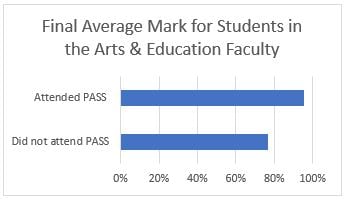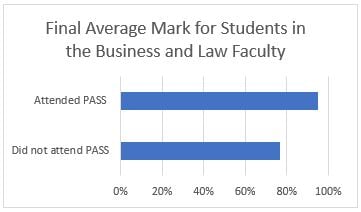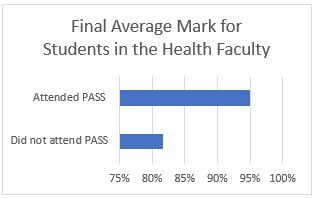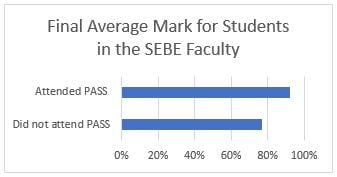Peer Assisted Study Sessions (PASS)
You have to study, so why not study in a group led by a student who has successfully completed the unit?
PASS (Peer Assisted Study Sessions) is free, voluntary and offered in tough units which have large enrolments. PASS sessions for units are offered online.
PASS is for all students - whether you are struggling, doing OK or a high achiever.
Students who join PASS learn effective study skills and develop communication, problem-solving and critical thinking skills while meeting lots of other students.
The 50-minute weekly online sessions are led by a PASS leader, a student who recently completed the unit so knows what you are going through and wants to help you succeed.
Check the current PASS timetable to see if there are PASS sessions for your unit.
A typical PASS session is a 50 minute online study session and might include:
- a review of the lecture and assigned readings
- group work and discussions
- problem-solving and critical thinking activities
- how to prepare for assignments and end of unit assessments or exams
- discussion of key course concepts
In a PASS session, we usually have a quick starting activity to work out what you want to study in the session. The PASS leader will then facilitate this through a variety of ways including small quizzes, group brainstorms, and other group activities.
Most of all, a PASS session is:
- student led
- student focused
- relaxed
- fun!
Just bring your questions!
PASS Testimonials
Students who attend PASS sessions generally perform better than those who don't attend PASS. These graphs represent the average final marks of students who attended PASS sessions compared to the students who did not attend any PASS session in Trimester 1 2021.
Arts and Education
Within Arts and Education, the average mark for those who did not attend any PASS sessions was around 77%. In comparison, those attending PASS sessions received an average mark of approximately 95.2%, a difference of 18.2%.
Business and Law
Within Business and Law, the average mark for those who did not attend any PASS sessions was around 74%. In comparison, those attending PASS sessions received an average mark of approximately 89.7%, a difference of 15.7%.
Health
Within Health, the average mark for those who did not attend any PASS sessions was around 82%. In comparison, those attending PASS sessions received an average mark of approximately 95%, a difference of 13.3%.
SEBE
Within SEBE, the average mark for those who did not attend any PASS sessions was 76.6%. In comparison, those attending PASS sessions received an average mark of approximately 92.1%, a difference of 15.5%.
Recruitment of PASS leaders for Trimester 1 2024 is now closed. Our next recruitment round will be in October 2024.
Why become a PASS leader
Being a PASS leader not only provides a fantastic, paid, off-campus job, it also enhances your own study and employability by helping them develop a myriad of knowledge and skills, including some of Deakin’s Graduate Learning Outcomes.
Research suggests1 that PASS leaders may improve their employability capabilities in a variety of ways. PASS leaders may develop:
- core technical skills
- organisational skills
- social skills
- professionalism and business acumen
- appreciation of mentoring
- critical thinking skills
Eligibility
Current Deakin students who have recently completed the unit and achieved a distinction or higher can apply for PASS leader positions.
If you apply you will engage in a full recruitment process. Candidates who are successful in their application must then attend training to ensure they understand what PASS is all about and are able to successfully facilitate PASS study sessions. Training covers areas such as:
- how to conduct active, facilitative study sessions
- understanding the boundaries of peer-professional working relationships
- effective communication
- troubleshooting.
PASS leaders are also provided ongoing professional development and support. If you are interested in becoming a PASS leader or would like more information, please contact pass@deakin.edu.au.




